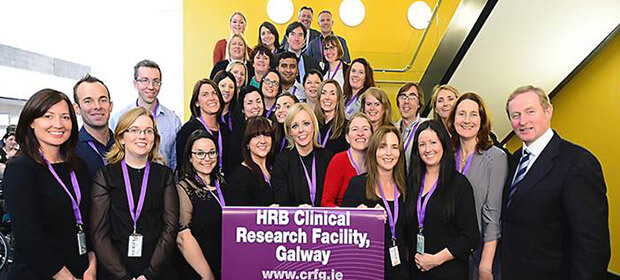The HRB Clinical Research Facility, Galway (HRB-CRFG) provides the infrastructure, physical space, facilities, expertise and culture needed to optimally support bioscience and biomedical research, writes Aideen O’Doherty, Programme Manager, HRB Clinical Research Facility Galway, National University of Ireland, Galway.

“The HRB-CRFG is a joint venture between Galway University Hospitals (GUH), Saolta and the National University of Ireland, Galway (NUIG). We have been in operation since March 2008, moving to a purpose-built clinical and administrative premises in June 2015. We focus on studies aimed at understanding a range of diseases and speedily translating the knowledge obtained through this research into reimbursed, regulatory approved advances in patient care.
The HRB-CRFG has enrolled more than 6,000 patients to research studies to date, with more than 220 studies in our research portfolio since we started in 2008.
“Our centre, built with funding from the Health Research Board (HRB), is located on the grounds of University Hospital Galway (UHG) and a short walk from the main NUIG campus. Due to our location, we have direct access to a large number of specialism-specific investigators, research associates and research support infrastructure. The new centre was officially opened by An Taoiseach Enda Kenny in September 2015 and we have been welcoming study participants, research affiliates and the general public ever since.

“Clinical research spans an enormous range of specialisms. For this, we require a broad spectrum of expertise including scientific writing and study design, data management and statistics, clinical and pharmacy, regulatory and research study management. As of December 2016, the HRB-CRFG has an immediate team of more than 60 personnel, with many more associates in the wider academic and medical community. We have over 70 Principal Investigators, each of whom may further involve their own clinical or scientific team in any one study and a variety of consortia or networks on the national and international levels.
“In brief, the HRB-CRFG consists of personnel dedicated to study and research unit management, clinical care, drug/device management, data handling and analysis, regulatory oversight and education.
“With funding from the HRB, we now occupy a dedicated premises, coupled with on-site study support activities such as coordination and data handling. We have space for a total of 26 – 28 outpatients and in patients, reserved for clinical research and supporting activities.
“We are physically co-joined with UHG across two floors, with direct and immediate access to the original hospital premises and clinical expertise in niche areas of research. Extensive collaboration with and oversight by both UHG and NUIG, ensures access to finance management, HR and legal support to guarantee compliance with both best practice and the appropriate legislation governing clinical research. This dynamic relationship ensures the continued success of the HRB-CRFG and all associated with it on the local, national and indeed international levels.
“The HRB-CRFG has enrolled more than 6,000 patients to research studies to date, with more than 220 studies in our research portfolio since we started in 2008.
“We have a large number of studies that are regulated by the Health Products Regulatory Authority (HPRA), the body that regulates drug and medical device studies. Independent ethics pre-approval is always required for initiating any study in the HRB-CRFG, as is the case nationally.
“Our studies span a wide range of disciplines. We run Observational and First-in-Human studies, along with Phase I to 4 studies, going from healthy volunteers to patients with chronic and acute conditions. We manage both academic grant-funded and industry-sponsored studies, all the time applying the principles of Good Clinical Practice and adhering to local and national legislation.
The research specialisms for HRB-CRFG studies span oncology, haematology, cardiovascular, endocrinology, respiratory, dermatology, psychiatric, gastroenterology, renal, infectious disease, obs/gynae, medical device and surgical, amongst others.
Funding for clinical research is available nationally through a variety of sources, including the HRB (www.hrb.ie), SFI (www.sfi.ie/), and charitable organisations amongst others. Irish academic investigators have also been successful recipients of international awards from the EU (Horizon2020 and ERC – https://ec.europa.eu/programmes/horizon2020/) and the Wellcome Trust (https://wellcome.ac.uk/), to name just two funding sources. NUIG’s Research Office and similar units in all academic institutions support research funding applications and provide information and advance notice of relevant upcoming calls for prospective academic applicants. Notably, collaboration and formation of national or international consortia and networks tends to enhance any funding application and provides a sound basis for the launch of a clinical research project once an award has been made.
Direct savings by the HSE in terms of alleviating the costs of standard care can be seen across a large number of HRB-CRFG -associated studies and a wide range of research specialisms.
Specific training to provide the basis to undertake or support clinical research is available across a variety of sources and to varying depths. Clinical research is a multi-disciplinary multi-faceted activity and requires specific knowledge and understanding of very complex principles and practices, stemming from the ICH-Guideline for Good Clinical Practice (GCP) 1996. These principles apply to studies involving medicinal products but are widely adopted and indeed compliance is expected in non-interventional studies and those involving medical devices. An additional set of specific guidelines apply to medical devices, namely ISO-14155.
The principles and requirements of GCP/ISO-14155 have been adopted into national and international legislation. As a result, there is a significant need for formal training around many specific aspects of clinical research. Through the HRB-CRFG, NUIG provides a Masters in Clinical Research, the only course of its kind in Ireland, covering aspects of clinical research study design, study management, regulatory and ethical requirements, statistics, health economics, systematic review and optimal management of study participants and their data. See www.pac.ie/nuigalway for more details. There are of course a multitude of formal courses and degrees in clinical research internationally, some of which are aimed at niche focus aspects of clinical research such as pharmacoeconomics, data confidentiality, legal implications, etc.
Further training is available through national initiatives and networks, such as the HRB-Trials Methodology Research Network (www.hrb-tmrn.ie/) and HRB-Clinical Research Coordination Ireland (www.hrb-crci.ie/), amongst others. Of course, as clinical research is so far reaching and multifaceted, there are numerous ways to attain training in this vast area at the national and international levels and can indeed be a life-long activity.
In general, it has been shown that patients who participate in clinical studies tend to respond better and have a more intensive pattern of care than those who do not. Informed consent is taken in advance from any participant in a clinical research study and those participants enjoy a personalised and protocol-prescribed clinical journey through the study in which they are participating. Feedback from participants is invariably positive, indeed with some participants electing to take part in further studies for which they may be eligible. The one-to-one focus provided through a study further substantiates the standard of care any patient receives, while providing invaluable data for prospective patient cohorts and treatments into the future.
Investment in clinical research from the institutional perspective is mirrored by significant cost savings otherwise incurred through standard of care and associated treatments. Direct savings by the HSE in terms of alleviating the costs of standard care can be seen across a large number of HRB-CRFG -associated studies and a wide range of research specialisms. Cost savings are directly quantifiable in terms of less expenditure on medications where the product is supplied through the study but also through non-interventional/observational studies where there is supplementary clinical oversight and where the research team assumes activities of clinical care that are otherwise undertaken by the HSE. In parallel, there are also major, difficult to quantify, savings on medicines in the community for participants involved in clinical research in general.
Investment needs to continue to ensure continued growth in this area, to help sell Ireland as an attractive location in which to undertake clinical research.

